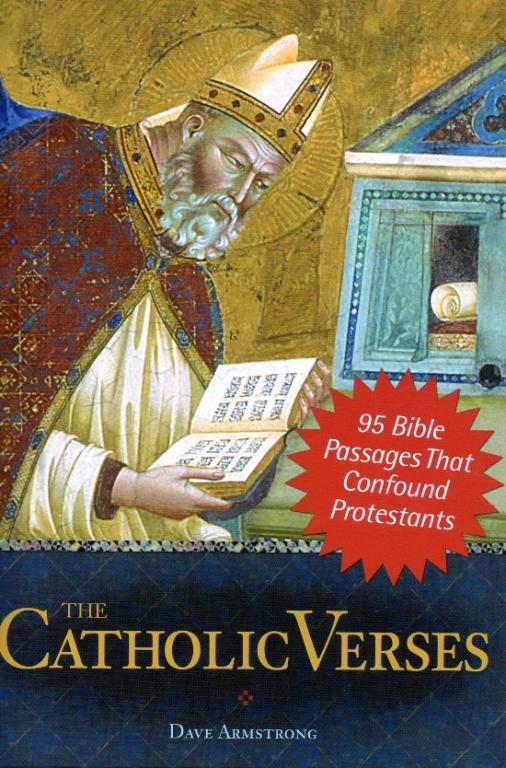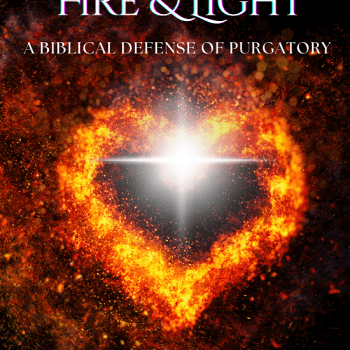[see the information page for this book, for full details and all purchase options]
(published by Sophia Institute Press in August 2004; 235 pages)
* * * * *
This was my third “official” publication in as many years, back in 2004, and the first of several, working with editor Todd Aglialoro: whose initial idea it was. The purpose and structure of this book (one of the most unique of all my books) was not simply a presentation of Catholic prooftexts (my Bible Proofs for Catholic Truths is that). Rather, the idea is the following (from the Introduction):
. . . a critique of common Protestant attempts to ignore, explain away, rationalize, wish away, overpolemicize, minimize, de-emphasize, evade clear consequences of, or special plead with regard to “the Catholic Verses”: ninety-five biblical passages that provide the foundation for Catholicism’s most distinctive doctrines. . . .
I will assert . . . the ultimate incoherence, inadequacy, inconsistency, or exegetical and theological implausibility of the Protestant interpretations, and will submit the Catholic views as exegetically and logically superior alternatives.
The structure ensures that the volume is relatively more “polemical” than other works of mine, but polemics is not a bad thing, if done right, and often in apologetics it is absolutely necessary. One must sometimes throw some “counter-punches,” so to speak. I document and “argue with” inadequate Protestant responses to our prooftexts and show how even some of the best Protestant exegetes start to play games and special plead when they have no cogent alternative explanation.
The two verses that were the most fun to deal with were the ones about “baptism for the dead” (what I called “the most ‘un-Protestant’ verse in the Bible”) and Paul’s prayer for the dead man Onesiphorus. Protestant explanations for those passages might be described (with charity) as “high comedy.” In any event, it makes for some entertaining reading to watch what they try to do with them. Apologetics is often a lot of fun!
From the book’s Introduction:
I shall contend throughout this book that, far too often, Protestants do not take all of Scripture into account, and that they are guilty of eisegesis (reading into Scripture one’s own presuppositions), at least as often as Catholics are, if not more often. Protestants (especially on a popular level) often emphasize relatively few “proof texts” to the exclusion of a great deal of relevant biblical data.
Moreover, only rarely do they seriously engage the biblical texts utilized by Catholics to support their positions through the centuries. In probably most cases, they are not even aware of any passages that a Catholic might use to prove anything that would be contrary to Protestantism. Habitually, they do not even entertain the possibility. For many Protestants, such a state of affairs is literally impossible. It is not supposed to happen. When Catholics and Protestants grapple over the Bible and its interpretation, Protestants must always win (so they casually assume).
I hasten to add – and emphasize to the greatest degree — that these tendencies of bias and subjectivism and subconscious influence of denominational traditions do not necessarily entail a deliberate attempt to ignore or to twist Scripture. Every serious student of the Bible comes to the biblical text with a theological framework, in order to interpret it and make sense of it in its entirety. This is proper and right, and no one should have any objection to it.
Both Catholics and Protestants engage in systematic theology, a method which involves finding proof texts for a given doctrine. In so doing, men will have honest disagreements, in good faith. We highly respect the devotion to Bible study and to theological reflection exhibited by many of our Protestant brethren – often putting Catholics to shame.
. . . This is not a scholarly work, as I am no scholar in the first place, but merely a lay Catholic apologist; but it is not “anti-scholarly,” and I will incorporate scholarship wherever necessary to substantiate the argument.
. . . I will assert – with all due respect and, I hope, with a minimum of “triumphalism” — the ultimate incoherence, inadequacy, inconsistency, or exegetical and theological implausibility of the Protestant interpretations, and will submit the Catholic views as exegetically and logically superior alternatives.
. . . If this book can convince the reader that Catholicism is at least as “biblically respectable” as any brand of Protestantism, I will have succeeded in my goal. In any event, I trust that all students of the Bible will be interested in comparative exegesis and a side-by-side analysis of competing views. Of course my ultimate aim is persuasion, but increased understanding (even while disagreement remains) is also a worthy accomplishment.














